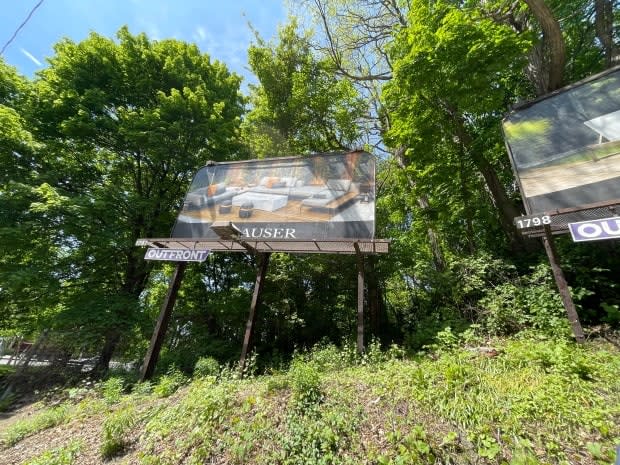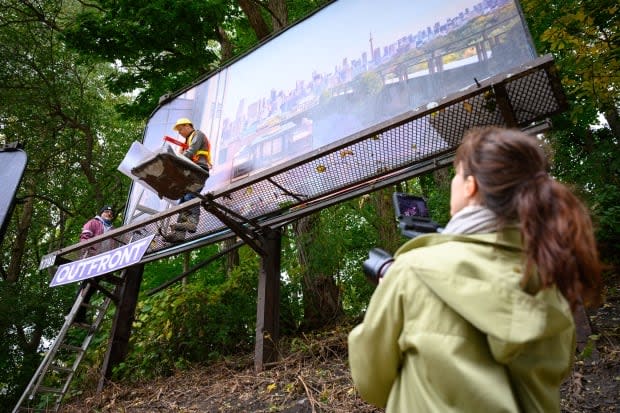A Toronto man's 15-year journey to rid the city of suspected illegal billboards

On Bathurst Street just north of Davenport, where the street begins to slope steeply, are two massive billboards with advertisements sitting side-by-side. They've been up for decades, but whether they are legal is a whole other question.
"They're in violation of the city's signed bylaws, which are designed to protect public spaces from having billboards everywhere," said Dave Meslin, a volunteer with a group called the Toronto Public Space Committee.
"And the city doesn't seem to want to do anything about it."
Meslin says these are just two of hundreds of suspected illegal billboards — that is, billboards that exist without an actual permit from the City of Toronto. For years, he's been pushing the city to start removing them.
"The city is our home … It's our shared space. So to me, it feels like a violation. I think that our shared public spaces should reflect who we are, what we believe in, and our values."
Meslin's fight is now the subject of a new documentary film called The Billboard Squad. He says it's about more than just trying to get corporations to follow the rules. It's also about reclaiming public space and determining who has the right to decide what our city looks like.
The rules
Meslin's journey began 15 years ago when he went to city hall to raise the issue of the two billboards on Burnside Drive — the official location of the signs that loom over Bathurst. He says city staff told him the billboards were not legal.
"They looked at the paperwork. They said, 'Oh, you're right, this is corporate garbage. There's no permits. We're going to take them down,'" said Meslin.
But 15 years later, the signs remain. Meslin says he believes threats of a lawsuit from the companies that own the billboards prompted the city to back off.

"To me, it's about so much more than billboards. It's really about who controls city hall. Is city hall a place that listens to the voices of neighbours and residents, or is it there to fulfil the wishes of corporate lobbyists?"
Through Freedom of Information requests, Meslin says he learned of more than 600 suspected illegal billboards.
"The sign industry lobby has been active and very involved in city politics for many years, and I believe that the status quo today is the result of the efficacy of their lobbying efforts," said Coun. Josh Matlow, who represents Ward 12, Toronto-St. Paul's and supports the fight to remove illegal billboards.
To put up a large sign, Matlow says there must be an application for a city permit, then an assessment. In most cases — with the exception of areas like Dundas Square or the Gardiner expressway — they're denied.
Matlow says the owners of the signs on Burnside have never produced a permit or any evidence they are in fact allowed to have the billboards, yet the onus is on the city to prove they're illegal. The trouble is, many billboards have been up for several decades and figuring out whether they're legal or not involves tracing back through historical records.

"What the city has told us is that they are skeptical that the city would be successful in course to have the signs removed, because the city would have difficulty demonstrating that the signs are, in fact, illegal," said Matlow.
"For the city to be scared or to go through a court process wondering whether or not they would lose, even if they haven't seen any evidence from the company — I think that's really ridiculous."
In a statement to CBC News, the City of Toronto says its sign bylaw applies to all signs constructed after 2010. The city says for signs constructed or approved prior to 2010, one would have to refer to the former municipal sign bylaws, which varied from municipality to municipality pre-amalgamation.
To take enforcement action on a sign, the city says it would have to prove that the it either had no permit, or that it had been substantially altered or modified without a permit, a task the city staff say could be "very difficult and time-consuming" because of the age of many signs.
In response to a question about the number of billboards in Toronto without a permit, the city's statement says: "we estimate that it is probably quite low."
The Billboard Squad
The Billboard Squad, by Cat Mills and Felicity Justrabo, is drawing international attention to Meslin's fight.
Mills told CBC News she first came across Meslin's story through a blog post he wrote 10 years ago. She went to a committee meeting to discover the fight was ongoing and she wanted to follow it.
"It's just so fascinating to me, the idea that billboards could actually be put up illegally," said Mills, who added they successfully pitched the documentary idea to Hot Docs, a documentary film festival based in Toronto, then received a full commission from Al Jazeera.

The film took two years to make, much of which took place during the pandemic, and most of it was shot outside.
"What I would really like people to take away from the film and what I think is important about it is the fact that we all live in a democracy," said Mills.
"You can walk around your city and if there are things that you don't like that you see that are happening in your city, you have the power to challenge it."

Meanwhile, Meslin says if the city doesn't act, he and other volunteers intend to put up local art on the suspected illegal billboards this summer.
"I've been interested in billboards my whole life because I think it's really symbolic of who really holds power in a city," said Meslin.
"So if ordinary residents like you and me have power, then we should be able to design our neighbourhoods the way we want them to look for us and our families."


